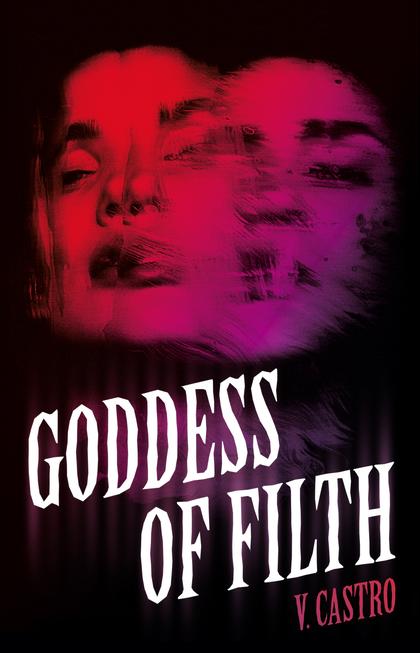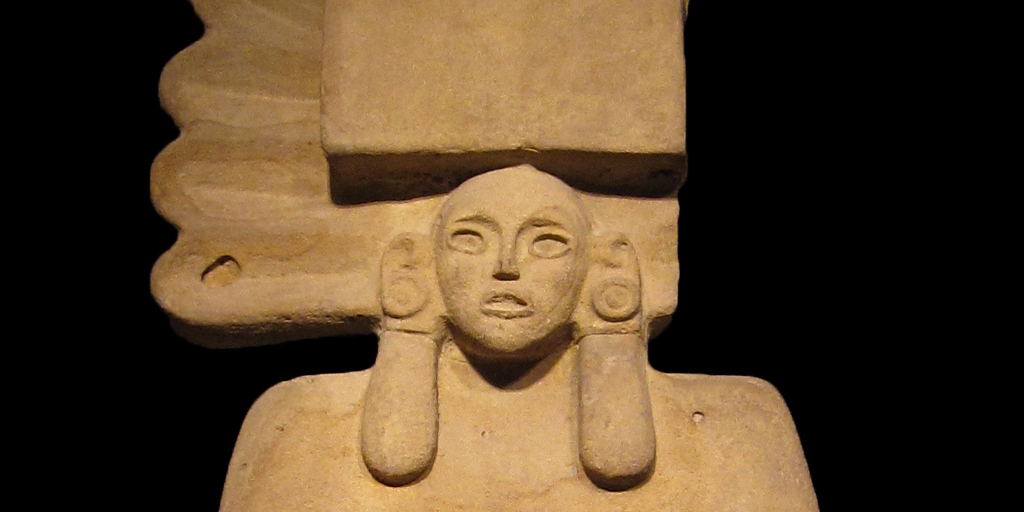V. Castro’s Goddess of Filth is a great possession narrative that breaks away from most of the elements reader have come to expect from the subgenre. At once a coming-of-age story about a group of young women caught in the interstitial space between high school and college and a tale that explores the effects of colonialism on religion, history, and even our thought process, this short novel is a perfect addition to Castro’s growing Latinx-centered oeuvre as well as a perfect starting point for those unfamiliar with her work.
Lourdes, Ana, Perla, Pauline, and Fernanda are high school friends looking for a way out of their homes and contemplating college. On a hot summer night, they get together and hold a séance just like the in the movie The Craft. They call for a spirit and have fun pretending to be brujas. Then things get serious when Fernanda starts crawling toward her friend while speaking Nahuatl, the language of the Aztecs. That night is scary, but the next few weeks are worse as Fernanda, a shy young woman with very strict parents who withhold a secret from her, starts acting strangely, masturbating in public, speaking Nahuatl regularly, and eventually sucking the sins out of the guilty (with disastrous consequences).

Fearing demonic possession, Fernanda’s family contacts a few local priests, but none of them manage to get her to respond. Finally, Father Moreno comes, and he becomes convinced that the entity inside Fernanda is a demon. However, Lourdes suspects it’s something else, and with the help of a professor who understand Nahuatl, she learns a lot about the thing inhabiting her friend, a thing far more ancient, and far less evil, than any of them could have guessed.
Goddess of Filth is a story of possession gone right, but it’s also a lot more. This is a narrative about female empowerment, friendship, and justice. These characters are poor brown women and they have to deal with the realities that come with that. They work crappy jobs, they have no money to go to the college of their choice, and everyone expects them to get pregnant and have no future. Despite all that, they persevere, work hard, push forward, and support each other as they pursue their dreams in various ways. Castro created a group of Latinx women who know where they come from and what their poverty and skin color mean to the rest of the world, but that doesn’t stop them. They’re smart, and their understanding of how the world works comes from years of being told the same things over and over again: “Be smart, but not too smart. Be beautiful, but not so pretty as to make other females mad. Be successful, but not bossy or overly ambitious. Nobody likes a mouthy brown woman. Be a declawed kitten.”
Castro takes everyday realities and ancient beings and mixes them smoothly here. Fernanda and Tlazoltéotl, the Goddess of Filth who now lives inside her, grow to understand each other and cooperate for a better world in a very dark way. And that sense of justice is just one of the many things Castro manages to infuse into her narrative without sounding preachy. For example, Father Moreno embodies colonialism and the erasure of indigenous religions and beliefs. He also becomes a force that, at gunpoint, restricts a young woman’s freedom and physical agency. While all of these elements work effectively within the story, the most successful is perhaps history, which Castro introduces via the scholar that helps Fernanda. She gives the story a unique historical perspective:
“Based on what she has said and what I have seen, I think she is inhabited by Tlazoltéotl. She is a fierce goddess; one I believe to be misunderstood but important. She is known as the goddess of filth. She is the eater of sin and the unclean. However, she also represents fertility after death.”
Horror can be simultaneously pulpy and profound, and Goddess of Filth sits comfortably between those two qualities. This is a novel about integrity, family, an ancient language, and growing up. However, it’s also about people getting their sins sucked out of them before quickly burning to death and young women discovering their sexuality in a truck with a young man they plan on leaving behind. This book is serious and fun, and that combination makes it a must-read for horror fans who want a little something extra, a spicy serving of social commentary, with their monsters, awful deaths, and possessions.
At the end of the book, a statement from Creature Publishing declares the press was founded “on a passion for feminist discourse and horror’s potential for social commentary and catharsis.” All those elements are present here, as they are in most of Castro’s work, and both the press and the book are worth checking out, because horror is uniquely equipped to be the mirror that shows us what we are.



